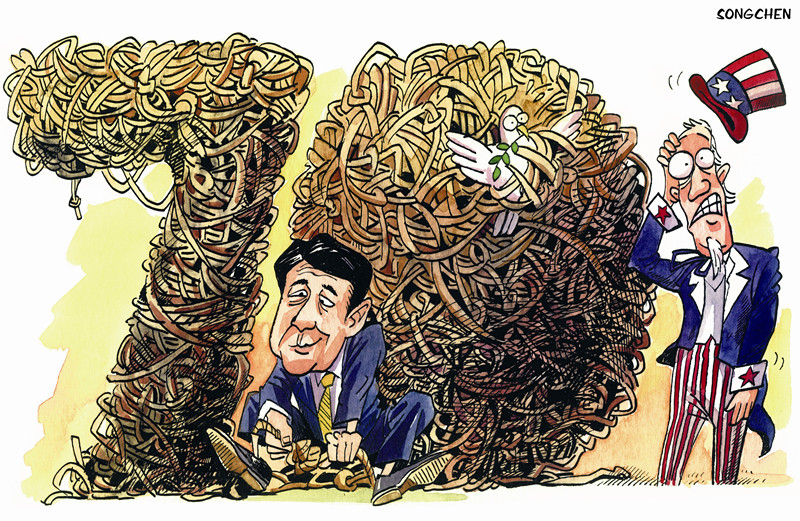Abe and his anti-US sentiment
- By Tadanobu Yamazaki
 0 Comment(s)
0 Comment(s) Print
Print E-mail China.org.cn, March 20, 2015
E-mail China.org.cn, March 20, 2015
|
|
|
[By Song Chen/China Daily] |
Japanese prime ministers had never attended any public events marking the deadly bombing of Tokyo during World War II. This had been customary. Everyone knew that it was because the bombings were launched by the United States, so the presence of a Japanese prime minister would tell the world that Japan had never forgotten the history, and this would greatly embarrass Washington and harm Tokyo's relationship with it.
Yet Shinzo Abe surprised us on March 10. What made him decide to attend the commemorative event?
First, it has something to do with his political views. Abe has always held that Japan should get rid of the post-war political structure, which is based on the U.S.-Japan alliance. After WWII, Washington had a wide-ranging influence on Japan's politics and diplomacy. Past Japanese politicians like Ichiro Hatoyama and Nobusuke Kishi struggled to remove this influence but did not succeed. Now, Abe is trying to do what the past generation couldn't do. Abe is definitely a right-wing politician, but this does not necessarily make him pro-Washington. The right-wing regime in Japan is divided into pro-U.S. and anti-U.S. groups, and Abe belongs to the latter. Despite repeated vows to tighten the U.S.-Japan alliance, Abe is actually against Washington.
Next, Abe's move has something to do with his view of history. His grandfather, Nobusuke Kishi, was a government minister during Hideki Tojo's reign. If Abe admits Japan's war crimes, he has to deny his grandfather's political activities. That's why Abe can't properly handle historical problems like the existence of "comfort women."
Abe is also considering issuing a statement on August 15 that undercuts the Murayama Statement, in which former Japanese Prime Minister Tomiichi Murayama apologized for the damage and suffering caused by Japan to its Asian neighbors during World War II. Given Abe's family background and his previous speeches, he is the one to glorify Japan's role in the war rather than criticize it. People like him believe that the war between Japan and the United States was started by the latter, and that the former was a victim, as 3 million people died in U.S. bombings.
However, despite his underlying anti-U.S. sentiment, Abe will show Washington that Japan will recognize its past actions in the war. Washington was unhappy over Abe's visit to the Yasukuni Shrine in 2012 and didn't side with Japan on the comfort women issue. Therefore, although Abe wants to revise Japan's constitution to get rid of the post-war structure, when faced with reality, he won't take a strong stand and oppose Washington in public.
In the short run, there won't be notable changes in the U.S.-Japan relationship because the policies that Abe has carried out, including exercising the right of collective self-defense, have so far been compatible with Washington's interests. As hypocritical as Abe is, when he visits Hawaii next month to mourn the U.S. soldiers killed in the Pearl Harbor attack, he will do his best to behave properly and maintain Japan's relationship with Washington.
The writer is a Japanese scholar residing in China.
The article was first published in Chinese and translated by Chen Xia.
Opinion articles reflect the views of their authors only, not necessarily those of China.org.cn.







Go to Forum >>0 Comment(s)